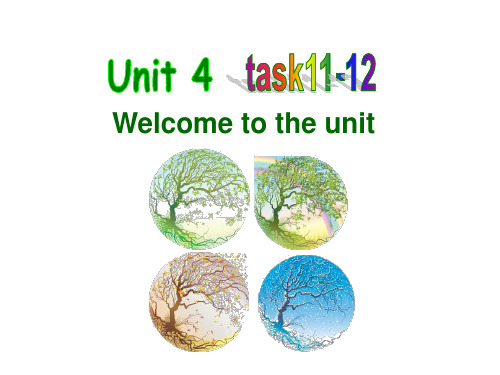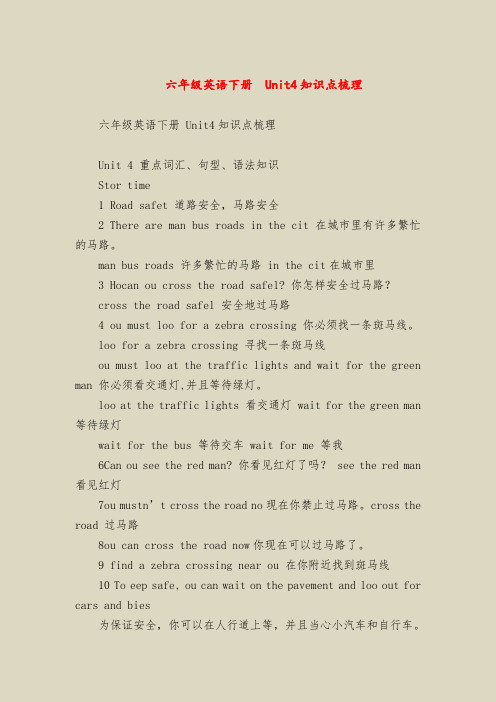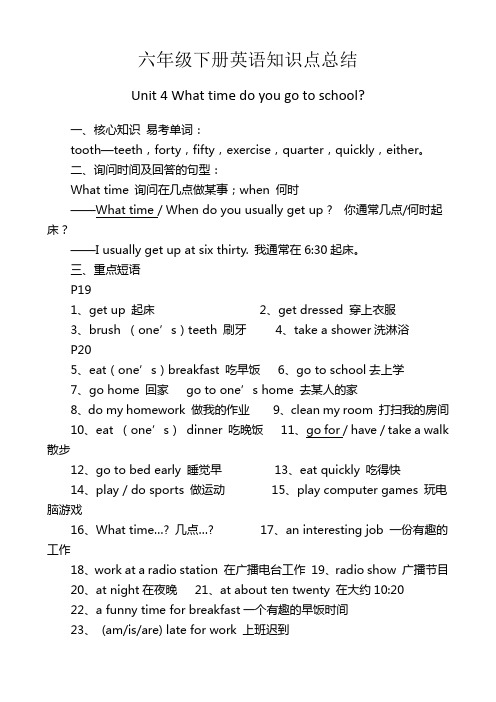人教精通版小学英语下册六年级四单元知识点1
小学英语六年级下册(人教精通版)Unit4 General Revision1 Task11-12课件

have snowball fights
make snowmen
TALK
Amy and Simon are talking about their favourite seasons. Let’s listen to their conversation and answer these questions.
Look! The ground is all wet . It’s _r_a_i_n_y_.
There is terrible fog. It is _f_o_g_g_y__.
Look! They are walking in the snow. Today is _s_n_o_w__y__.
1. Which season does Simon like best? Why? Autumn. Because it’s always sunny. It’s the best time to play football outside.
2. Which season does Amy like best? Why? Summer. Because she can go swimming and enjoy ice cream.
变化规则
名词
Rain Wind Snow Cloud Sun Fog
形容词
Rainy Windy Snowy Cloudy Sunny Foggy
Fill in the blanks according to the pictures.
It’s _r_a_i_n_y_.
It’s _f_o_g_g_y_.
Welcome to the unit
What’s the weather like?
六年级英语下册 Unit4知识点梳理

六年级英语下册 Unit4知识点梳理六年级英语下册 Unit4知识点梳理Unit 4 重点词汇、句型、语法知识Stor time1 Road safet 道路安全,马路安全2 There are man bus roads in the cit 在城市里有许多繁忙的马路。
man bus roads 许多繁忙的马路 in the cit在城市里3 Hocan ou cross the road safel? 你怎样安全过马路?cross the road safel 安全地过马路4 ou must loo for a zebra crossing 你必须找一条斑马线。
loo for a zebra crossing 寻找一条斑马线ou must loo at the traffic lights and wait for the green man 你必须看交通灯,并且等待绿灯。
loo at the traffic lights 看交通灯 wait for the green man 等待绿灯wait for the bus 等待交车 wait for me 等我6Can ou see the red man? 你看见红灯了吗? see the red man 看见红灯7ou mustn’t cross the road no现在你禁止过马路。
cross the road 过马路8ou can cross the road now你现在可以过马路了。
9 find a zebra crossing near ou 在你附近找到斑马线10 To eep safe, ou can wait on the pavement and loo out for cars and bies为保证安全,你可以在人行道上等,并且当心小汽车和自行车。
句首用to表目的,意为“为了……”eep safe = sta safe 保持安全wait on the pavement 在人行道上等待loo out for cars and bies 当心小汽车和自行车loo out for 当心,当心11 ou must first loo left, then right and then left again你必须先看左边,然后看右边,再看左边。
人教PEP六年级下册Unit4(1)重点知识梳理2022

第四单元知识点梳理物以类聚,人以群分。
《易经》原创不容易,【关注】,不迷路!一、单词dining体育馆ago以前cycling骑自行车运动gocycling去骑自行车ice-skate滑冰badminton羽毛球运动二、短语…yearsago(几)年前…montontinton打羽毛球三、句子1.TyoldscputerorInternetinmytime.我那时候没有电脑也没有网络。
5.Before,Iwasquiet.NowIamveryactiveinclass.我以前很安静。
现在我在课堂上很活跃。
6.Iwassybikewell.我以前个子小,自行车骑得不好。
7.NowIgocyclingeveryday.现在我天天骑车。
四、作文:LastweekendIwasbusylastweekend.Saturdaymorning,Ididmyework.Tygrandparents.In tmingwityfriends.Sundaymorning,myparentsandIwenttoapark.Wewentboating andflewkites.Itwasahappyweekend.【素材积累】岳飞应募参军,因战功累累不断升职,宋高宗亲手写了“精忠岳飞”四个字,制成旗后赐给他。
又召他到寝阁,对他说:“中兴的大事,全部委托给你了。
”金人攻打拱州、亳州,刘锜向朝廷告急,宋高宗命令岳飞火速增援,并在赐给岳飞的亲笔信中说:“设施之事,一以委卿,朕不遥度。
”岳飞于是调兵遣将,分路出战,自己率领轻装骑兵驻扎在郾城,兵锋锐气十足。
但是,后来高宗和秦桧决定与金议和,向金称臣纳贡。
就在岳飞积极准备渡过黄河收复失地的时候,高宗和秦桧却连发12道金字牌班师诏,命令岳飞退兵。
后岳飞被以“莫须有”的罪名毒死于临安风波亭,时年仅39岁。
人教版六年级下册英语三四单元的知识点总结。

人教版六年级下册英语三四单元的知识点总结。
English:In the sixth grade textbook of People's Education Press, Unit Three focuses on "Let's play sports" and Unit Four focuses on "Let's go camping". Unit Three covers topics like talking about sports, expressing preferences, and asking and answering questions about sports. Students learn vocabulary related to various sports such as basketball, football, volleyball, table tennis, and swimming. They also practice forming sentences using verbs like 'play', 'watch', and 'like' in the context of sports. Grammar points include the use of the present continuous tense to talk about actions happening now, as well as the use of question words like 'What', 'When', 'Where', 'Who', 'Which', and 'How' to form questions and responses. Unit Four, on the other hand, introduces camping-related vocabulary such as tent, flashlight, sleeping bag, map, compass, and campfire. Students learn about activities like setting up a tent, using a compass, reading a map, and making a campfire. Grammar focuses on imperative sentences for giving commands and requests, as well as prepositions of place and direction. Both units incorporate listening, speaking,reading, and writing exercises to enhance students' overall English language skills.中文翻译:人教版六年级下册英语第三单元着重于“让我们做运动”,第四单元着重于“让我们去野营”。
新人教版六年级英语下册 第一单元至第四单元知识点归纳

新人教版六年级英语下册第一单元至第四单元知识点归纳一、必背词汇tall ------ taller 高的----更高的dinosaur 恐龙short ------ shorter 矮的/短的----更矮的/更短的hall 大厅long ------ longer 长的----更长的than 比strong------ stronger 强壮的----更强壮的both 两个都old ------ older 老的/旧的----更老的/更旧的meter 米形容词young------ younger 年轻的----更年轻的kilogram千克;公斤adj. small------ small 小的----更小的others size 号码thin ------ thinner 瘦的----更瘦的feet 脚heavy------heavier 重点----更重的wear 穿low------lower低地----更低地countryside乡村smart------smarter聪明的----更聪明的shadow 影子;阴影变成;开始变得辅+元+辅 --------双写最后一个辅音字母+er辅音字母+y -----改y为i +erbig-----bigger 大的-----更大的happy-----happier 开心的-----更开心的thin-----thinner瘦的-----更瘦的heavy-----heavier 重的------更重的fat-----fatter 胖的------更胖的funny-----funnier 滑稽的-----更滑稽的二、重点句型⑴问年龄;身高;体重等How old are you? How tall are you? How heavy are you?- I’m _______ (years old). -- I’m ______metres tall. --- I’m ______ k ilograms .⑵问物品的情况:① How large is your room? 你的房间有多大?It’s __________ m2 (square meters.) 有_______ 平方米。
六年级下册英语第四单元知识点总结

六年级下册英语知识点总结Unit 4 What time do you go to school?一、核心知识易考单词:tooth—teeth,forty,fifty,exercise,quarter,quickly,either。
二、询问时间及回答的句型:What time 询问在几点做某事;when 何时——What time / When do you usually get up ? 你通常几点/何时起床?——I usually get up at six thirty. 我通常在6:30起床。
三、重点短语P191、get up 起床2、get dressed 穿上衣服3、brush (one’s)teeth 刷牙4、take a shower洗淋浴P205、eat(one’s)breakfast 吃早饭6、go to school去上学7、go home 回家go to one’s home 去某人的家8、do my homework 做我的作业9、clean my room 打扫我的房间10、eat (one’s)dinner 吃晚饭11、go for / have / take a walk 散步12、go to bed early 睡觉早13、eat quickly 吃得快14、play / do sports 做运动15、play computer games 玩电脑游戏16、What time…? 几点…? 17、an interesting job 一份有趣的工作18、work at a radio station 在广播电台工作19、radio show 广播节目20、at night在夜晚21、at about ten twenty 在大约10:2022、a funny time for breakfast一个有趣的早饭时间23、(am/is/are) late for work 上班迟到P2124、on school days 在上学日25、on weekends在周末P2226、at half past nine 在9:3027、at a quarter past ten 在10:1528、at a quarter to ten 在9:45P2329、have much time for breakfast有很多时间吃早饭30、after school 放学以后31、do my homework first 先做我的作业32、have / eat a good breakfast 早饭吃的好33、fruit and vegetables水果和蔬菜34、be (not) good for sb. 对某人(不)好35、taste good 尝起来好吃36、healthy habits 健康的习惯unhealthy habits 不健康的习惯37、have a good job 有一份好工作四、重点句型1、What time do you usually go to school? 你通常几点去上学?2、Scott has an interesting job. 斯科特有一份有趣的工作。
六年级下册第四单元英语知识点
六年级下册第四单元知识点一、动词过去式learn Chinese learned Chinese 学汉语eat good food ate good food 吃好吃的食物take pictures took pictures 照相climb climbed 爬buy presents bought presents 买礼物row a boat rowed a boat 船see elephant saw elephant 看大象go skiing went skiing 去滑雪go ice-skating went ice-skating 去滑冰二、语法特殊疑问句:以特殊疑问词1、(what , where , who , which , when , whose , why , how等)开头引导的句子。
此类句子应该问什么就答什么,不能用“yes 、no”来回答。
如:特殊疑问词what 什么 What did you do last week?where 哪里 Where did you go on your holiday? who 谁 Who are you going with?whose 谁的 Whose book is there?when 什么时候 When are you going ?how 怎样 How did you go there?which 哪一个 Which monkey do you like?why 为什么 Why do you like that?•例如:What is this?•It’s a computer.•What does he do?•He’s a doctor.•Where are you going?•I’m going to Beijing.•Who played football with you yesterday afternoon?•Mike.•Which season do you like best?•Summer.•When do you usually get up?•I usually get up at 6:30.•Whose skirt is this?•It’s Amy’s.•Why do you like spring best?•Because I can plant trees.•How did you go to Xinjiang?•I went to Xinjiang by train.2、特殊疑问词 How•其中how又可以和其他一些形容词连用组成特殊疑问词组用来提问,如:how many(多少(数量)),how much(多少(钱)),how tall(多高),how long(多长),how big(多大),how heavy(多重).heavy tall long muchmany big far often(1) How long is the Yellow River? It’s 6300 KM.(2) How tall is Mr Green?He’s 175cm.(3) How big are your feet?I wear size 18.(4) How much is the white T-shirt?It’s 100 yuan.(5) How many apples are there in the bag?There are 51.(6) How heavy is the fish? It’s 2kg.时间介词at,on,in的用法1.at用在具体的时刻和中午前面。
最新版六年级下PEP英语 Unit 4单元知识梳理(1)
六年级下册单元知识点第四单元四会单词:learn Chinese—learned Chinese学汉语sing and dance—sang and danced 唱歌和跳舞eat good food—ate good food吃好吃的食物take pictures—took pictures 照相climb—climbed 爬have—had buy presents—bought presents买礼物row a boat—rowed a boat 划船see elephant—saw elephant 看大象go skiing—went skiing 去滑雪go ice-skating—went ice-skating 去滑冰how怎么,如何get—got 到达last上一个的,仅余的,留在最后的四会句型:Where did you go on your holiday? 你去哪里度假了?I went to Xinjiang. 我去新疆了。
How did you go there? 你怎么去那儿的?I went by train.我坐火车去的。
应该掌握的知识点:1、时间前介词的用法:英语中不同的时间前所用的介词不相同,一般有如下规则(1)在表示一段时间的词语前用in,如在年份、月份、季节前用in,如in2009, in May, in spring等。
另外在上午、在下午、在晚上也用in. in the morning, in the afternoon, in the evening.(2)表示在某一天,在星期几,在几月几日时用on,如on Monday , on May 1st. 另外还有on Tuesday morning.(3) 表示具体的时刻,在…几点钟时用at。
如at 6 o’clock. at 7:20.2、英语书信的书写格式;(1)称呼:指导对收信人的称呼。
一般从信纸的左边顶格写起。
英语六年级下册第四单元
英语六年级下册第四单元可能包括不同的主题和内容,具体取决于使用的教材。
一般来说,以下是可能出现在六年级下册第四单元的一些主题和知识点:
1.语法:本单元可能涉及一些基本的语法知识,如动词时态、名词性物主代词、形容
词和副词的比较级和最高级等。
学生需要掌握这些语法规则,并能够正确运用它们进行口头和书面表达。
2.词汇:本单元将介绍一些与主题相关的词汇,如动物、运动、旅行等。
学生需要掌
握这些词汇的拼写、发音和含义,并能够运用它们进行简单的对话和写作。
3.阅读理解:本单元的阅读材料可能涉及一些有趣的故事、科普文章或文化介绍等。
学生需要通过阅读了解文章的主要内容、结构和语言特点,并能够回答与文章相关的问题。
4.写作:本单元的写作任务可能包括描述动物、介绍运动或编写旅行计划等。
学生需
要运用所学的语法和词汇知识,进行简单的写作练习,并能够用正确的语言表达自己的思想和观点。
5.口语表达:本单元的口语练习可能包括角色扮演、讨论或演讲等。
学生需要积极参
与口语活动,运用所学的语言知识进行口头表达和交流,并能够听懂和理解他人的观点和意见。
六年级下册unit4知识点
六年级英语下册第四单元知识点讲解一.重点词汇:买礼物拍照吃美食又唱又跳看大象学英语去学校努力工作迟到去加拿大爬山学汉语堆雪人玩的开心去饭店打乒乓球划船去滑雪去滑冰乘飞机坐火车每天在周一/二/三去年二.重点句子:1. 特殊疑问句What did you do there? 你在那儿做了什么?Where did you go on your holiday? 你去哪里度假了?(询问动作发生的地点)How did you go on your holiday? 你度假怎样去的?(询问乘坐交通工具的方式)How was your holiday?你假期怎么样?When was your last trip? 你上次旅行是什么时候?(询问动作发生的时间)2. 一般疑问句:Did you have a good time on your holiday? 你假期玩的开心么?Did you take any pictures? 你拍些照片了么?3.否定句:People didn’t travel by plane. 人们过去没有乘飞机旅行。
I can’t believe it. 我不相信。
4. have a good time.=have a great time.=have fun. 玩的开心!5.Tomorrow I am going to row a boat. 明天我将去划船。
be going to +动词原形(一般将来时)6. here引导的句子时,要全倒装Eg. Here is the rabbit. 兔子在这儿。
Here comes a spaceship. 一个飞船来这儿了。
注意:若代词做主语,只把here提前主谓语序不变。
Eg. Here he comes. 他来了。
Here you are./ Here it is. 给你。
- 1、下载文档前请自行甄别文档内容的完整性,平台不提供额外的编辑、内容补充、找答案等附加服务。
- 2、"仅部分预览"的文档,不可在线预览部分如存在完整性等问题,可反馈申请退款(可完整预览的文档不适用该条件!)。
- 3、如文档侵犯您的权益,请联系客服反馈,我们会尽快为您处理(人工客服工作时间:9:00-18:30)。
Task 1&2 1.life生活;生命人们家人学习世纪班级年级开
.父母亲医生老师家书司机护士邮递员警察消防
school小学morning每天早上up 起床breakfast吃早饭to 去上学the morning在早上the afternoon在下午the evening 在晚上lessons上课 a week 在一周much非常lunch吃午饭school在学校home 回家one’s homework做家庭作业school放学后dinner吃晚饭TV看电视the piano 弹钢琴park主题公园
life日常生活
’s Gao Wei./I’m Wang LIli.
old are you /I’m twelve.
are you from/I’m from China.
class are you in/ I’m Class One,Grade Six.
do you do/ I’m a student.
6. What does your father do/He’s a doctor.
7. What does your mother do/ She’s a teacher.
many people are there in your familyWho are they
There are three people in my are my father,my mother and I .
school are you in / I study in School.
time do you usually get up in the morning/I usually get up at 6:00 in the morning.
time do you usually go to school/ I usually go to school at 7:30 in the morning.
many subjects do you have What are they
We have seven are Chinese,maths,English,science,PE,art and music. 13. How many lessons do you have in a day/We have six lessons in a day.
14. How many English lessons do you have in a week/We are three lessons in a week.
is your English teacher/Mr Wang is our English teacher.
you like English/Yes, I do./No, I don’t.
subject do you like best/I like English best.
18. What time do your classes begin in the morning Our classes begin at 8:00 in the morning.
4页)
中国(Britain)英国(the USA) 美国4. Canada 加拿大5.
澳大利亚日本新加坡德国酷的10. pretty 漂亮的年纪名字地址电话工作
English 讲英语number 电话号码place 办公地点
do you live/ I live at 16 Yongfa village./I live in Wudalianchi city.
3. What’s your hobby My hobby is singing./ I like singing./ I’m interested in singing.
页)
office邮局超市4. bookshop书店5. toy shop玩具店 6. cake shop蛋糕店医院饭店9. library 图书馆旅馆银行公园电影院博物馆15. bus stop 车站16. shopping centre购物中心
社区
在…上面在…下面在…后面5. in front of 在...前面6. on the right 在右边7. on the left 在左边8. across the road马路对面在…附近在…旁边11. between.在…之间
Task 7&8(46页)
单词:
规则保持. 早的4. late晚的声音;噪音问回答问题积极地更年轻的。
